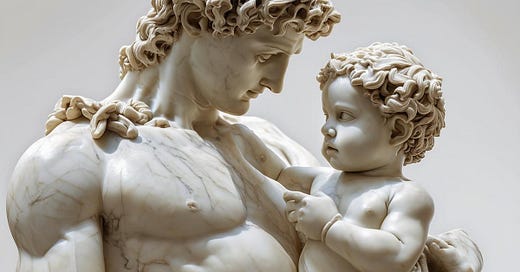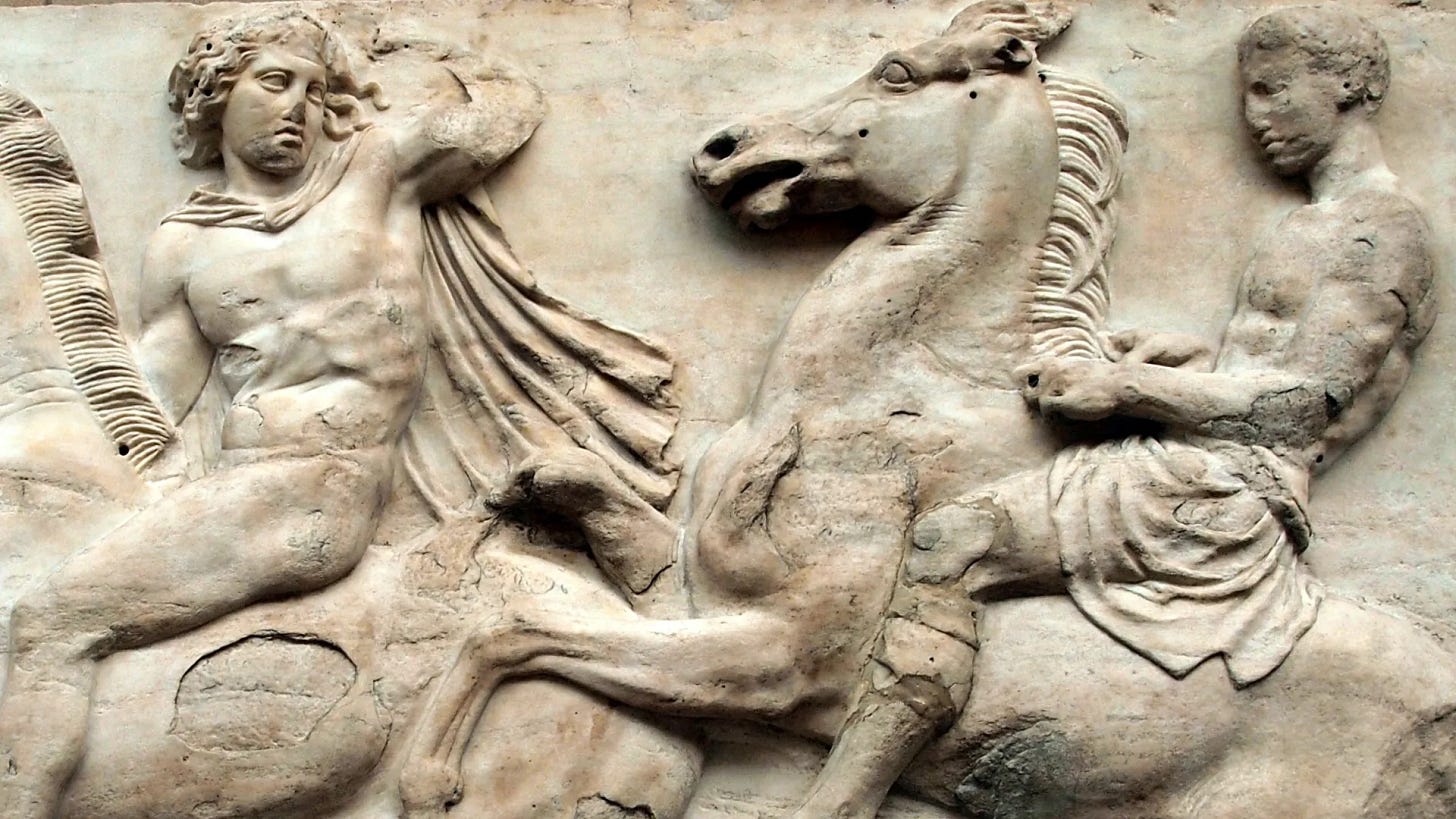The journey of the Koryos and the Korybantes is linked to the defeat of Kronos. And this sacrifice is not a denial of structure but a redefinition of what structure means. By rejecting repression, one opens oneself up to vulnerability, creativity, and the full spectrum of human experience. This is a courageous act, as it requires facing the shadow and accepting the unknown. In rejecting the Kronian ego, one moves beyond the false dichotomy of order versus chaos. Wolf-Apollo thus represents the unity of opposites: reason tempered by instinct, structure rooted in nature, and leadership that honors individuality.
This is why in the ancient pagan days, we had rites of passages for young men and women. Guided by protector deities and role models like Artemis and Apollo. The young children (boys and girls) between age 5 to 8 where taught about the environment and the wisdom of nature under the care of Artemis. Where later young adolescent women as Arktoi would go through the Arkteia rite of passage. Where the young adolescent men as ephebe of Apollo, the Fianna of Ireland, and in the more ancient sense Koryos warrior, went through this rite of passage instead. The Fianna for instance had three mottoes. Purity of our hearts. Strength of our limbs. Action to match our speech. They were guided by an elder who became a mentor figure for them, whilst on their journey in the wilderness.
This to ensure that the young men of the tribe would become healthy, strong, compassionate and independent men. Men who can protect their tribe like wild wolves, yet be gentle and kind to their families. Those who guided them through it and the linked deities like Apollo and Artemis, were the protectors of the youth. A role for instance the amphipoloi of Artemis would be proud of. They were those who after having gone through the rites themselves served as guides and protectors.
Many in society are still enmeshed into the family in an unhealthy manner. Where you become subsumed into the family, and then into the society as well. Leaving no space for the individual to find their own place in society in a more balanced and healthy way. This does not mean that family is not important. It means that we can't be psychologically enmeshed with them, as if we are mere extensions of it. We are each our own person, with needs, wants and desires, and also our own dreams. Each person also carries within them a gift towards society. It is the task of civilization and its stewards, which are represented by figures such as Apollo and Artemis to guide the person towards that. Not through mere education. As this is an entire other ballgame. Yet psycho-spiritually help them develop into who they are. The thing is that the parents of today raise children, who become the parents of the future.
Rite of Passage
In the ancient times every young adult went through these rites, to ensure that they could become healthy, grounded and connected individuals. Officially part of society. Where they were not even allowed to marry unless going through them, thus forbidden from marriage and having a family. The reason being simple. If we do not protect and nurture the young and help them, and with it the inner child, through these rites to grow and become healthy grounded people, fit to be healthy parents, we rob not only them of their future, but we rob all future generations of theirs. In a more modern sense we understand this as intergenerational trauma. Parenting practices thus affect not just individual families but the fabric of society as a whole.
Thus these rites, such as the Arkteia of Artemis, or the Koryos of Wolf-Apollo were and are highly important for any civilization if it wants to thrive and not fall into decay. The true guardian of society, like Aragorn also has healing hands. Unlike the conventional control-based approaches to child-rearing, which focus on restricting and shaping behavior according to societal norms, the Korybantes represent a parenting style that is about holding space for a child’s spiritual unfolding. It is a style rooted in freedom, presence, and spiritual guidance, where the child’s innate essence is nurtured rather than suppressed. Instead in traditional control-based parenting, protection often manifests as suppression. Parents may feel that in order to protect their children from harm or failure, they must impose rigid rules, set limits, and control their environment. While such measures are often well-intentioned, they stifle the child’s growth and authenticity, as they are taught to suppress their true self, whether emotional, creative, or spiritual.
Korybantes-style parenting
In contrast, Korybantes-style parenting recognizes that true protection of a child’s spirit comes not from control but from a deeply held commitment to space and freedom for the child to experience the world and themselves. This freedom is not one of unchecked chaos, but of guidance and presence that nurtures the child’s innate connection to their own divine spark. The Korybantes did not control or restrict Dionysus; they provided protection, guarding his divine essence and allowing him to grow into his own power, to face both the light and the dark within himself. In this form of parenting, the focus is not on restraining but on holding space for the child’s emotional, psychological, and spiritual growth.

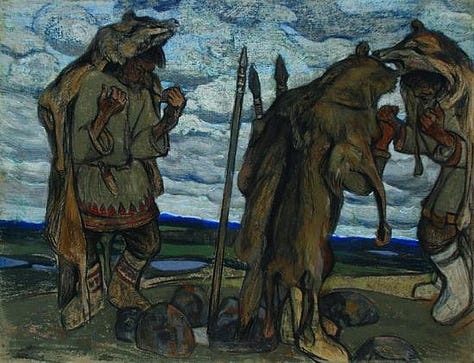

It is the space where the child can express themselves freely, where creativity can flourish, and where they can engage with life’s many initiations, learning through experience and spiritual embodiment rather than through rigid directives. As parents in this tradition, the focus would be on teaching children through movement, through story, through myth, and through a deeply embodied connection with nature. Rather than merely instructing or correcting, Korybantes-style parenting places emphasis on presence. It asks the parent to be fully attuned to their child’s emotional and spiritual needs in the moment, to witness their unfolding and offer guidance when necessary, but never to dictate or limit. Children would be taught to express their emotions, feel deeply, and move freely in the world. Whether through dance, play, or creative arts. The goal would be to help them stay connected to their inner spark, authentic self, and the divine that lives within them. The Korybantes did not protect Dionysus by stifling or controlling his wildness.
Protecting the Child’s Spiritual Essence
In Korybantes-style parenting, the focus is on protecting the child’s spiritual essence, not through restriction, but by shielding them from societal projections and external judgments. This means teaching children to discern between the truth of their inner selves and the messages they receive from the outside world, whether from peers, media, or cultural expectations. The goal is not to make the child fit into the world but to help them navigate the world while retaining their authenticity and power. They are not molded to fit a predetermined box but are guided to remain in alignment with their own truths, learning to hold their own ground in a society that may try to define or limit them.
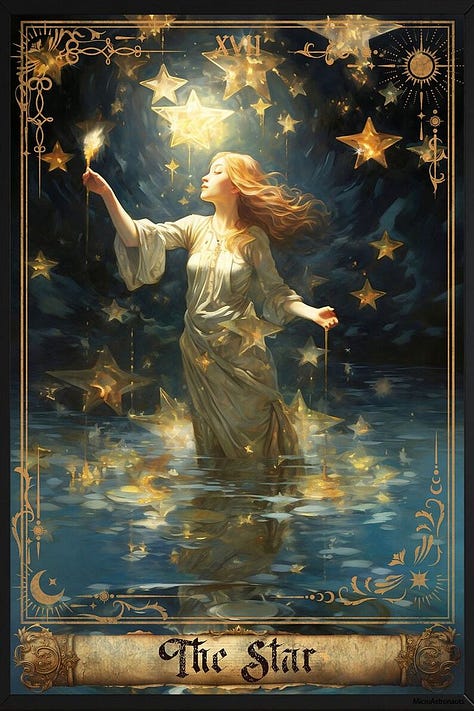
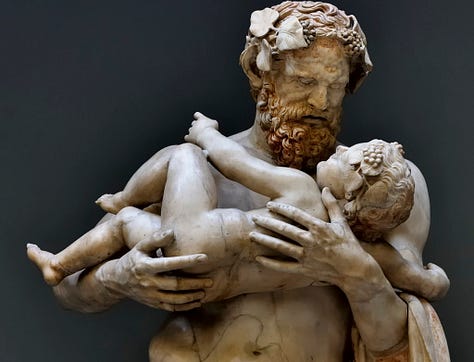
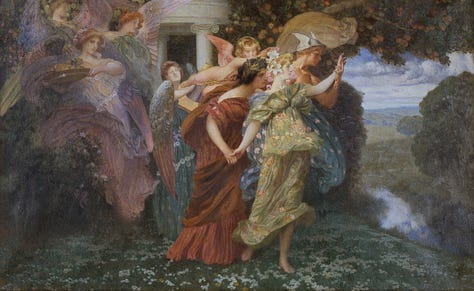
The “shadow” refers to the aspects of ourselves that are often repressed or denied, whether emotions, desires, or behaviors that don’t fit neatly into societal norms. In a Korybantes-inspired approach to parenting, children are encouraged to face these aspects of themselves rather than repress them. Emotional depth, vulnerability, and complexity are not seen as weaknesses to be hidden, but as strengths to instead be integrated into the self. Children are taught to dance with their complexity, learning to experience and express both joy and grief, strength and vulnerability, without fear of judgment.
Which means that they do not form the rigid Kronian ego, but instead a more Hermes like ego. Where when they get between the age of 12 to 24 years, they can undergo their Koryos initiation with their peers. Their heroes journey, by being much deeper initiated into what it means to be a man. Or for women, what it means to be a girl. Not in the limited societal social norm sense, but in the archetypal wholeness of masculinity and femininity. Symbolized by Wolf-Apollo and Artemis. By engaging with their shadow and primal instincts, children learn not only to navigate their inner worlds but also to live more fully in the outer world. This is not a journey of escape, but one of embrace. So of learning to move with life’s forces rather than against them.
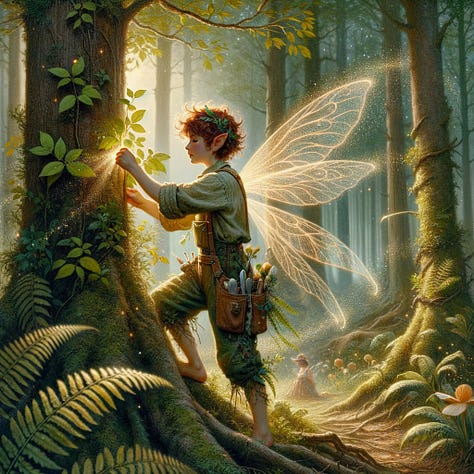
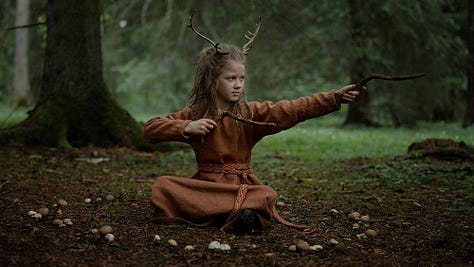

The journey of raising a child and nurturing ones own inner child are not separate. As our own wounding influences how we raise our own children. Our inner child and our own children are intricately connected. Both require a deep understanding of the child’s divine essence. An essence that is not bound by societal expectations. Likewise, nurturing the inner child involves the same principles. To nurture the inner child is to shield them from the external world’s constant attempts to shape them into a fixed identity. We must reclaim our authenticity by teaching our inner child to discern between societal expectations and the deep truths that lie within.
This involves recognizing and rejecting external narratives that tell us we are not enough, or that our emotions, creativity, or spiritual essence are unworthy. By standing guard against these projections, we protect the sacred essence of our inner child, allowing them to flourish and express their true selves. It does for many mean to acknowledging their fears, insecurities, and unhealed wounds. Shadow work with the inner child is not about rejecting or avoiding the pain, but about dancing with it, learning from it, and allowing it to guide us to greater understanding and healing.
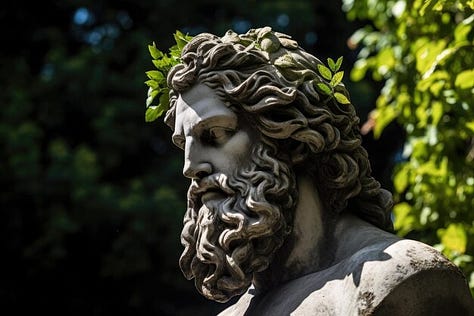
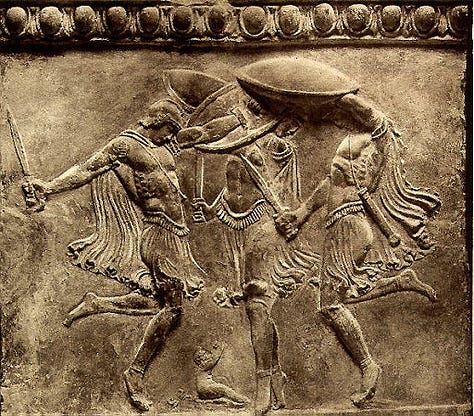

The Korybantes raised Dionysus not to dominate but to embody divine presence. Thus cultivating self-sovereignty, rooted in compassion, integrity, and connection with the divine, not egoic power. Yet this outer parenting style, would also mean that the essence of a child would remain whole, untouched by unnecessary fragmentation. The ego would not form as a defense against trauma but as a flexible tool for navigating the world. The superego would not develop as a punishing voice but as a gentle inner guide modelled after healthy archetypes. The shadow would not be repressed but consciously integrated through storytelling, myth, and emotional honesty.
The child would be taught early on that their essence is deeper than their outward roles. The ego would become a tool for play, learning, and social interaction. Thus never mistaken for the true self. Compassion and empathy would be modelled through connection rather than authority. Mistakes would be framed as part of the soul's learning, not moral failings. Emotional expression would be encouraged instead of repressed. Emotions like anger, grief, and fear would be honored and processed, not shamed. The persona would become fluid, adaptable, and healthy rather than rigid and performative. Emotions would be embraced as sacred teachers.

